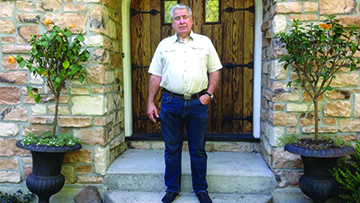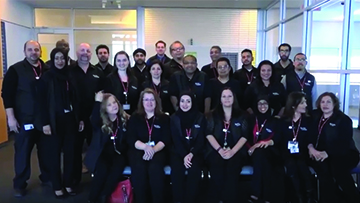Modernizing our programs and services
The government has set an ambitious agenda, with a strong emphasis on services to Canadians, openness and transparency, collaboration and innovation. Through the delivery of key government programs and services – from service improvement strategies for the Old Age Security and Employment Insurance to cutting edge consultations on accessibility legislation – ESDC is leading the way.
Engaging employees and all Canadians in developing creative solutions and empowering them to make a difference is our new normal. Through our Innovation Lab we are testing methodologies like behavioural economics to help connect employees with job seekers, and through our recent Homelessness Partnering Strategy Hackaton, we’re collaborating with community partners and experts to brainstorm new ways to address homelessness.
To achieve positive change, we have to be comfortable taking intelligent risks, trying new things and learning from mistakes.
The more visionary and high performing we are in responding to the evolving needs of citizens, the more pride we take in our work — which we know contributes to the quality of life for Canadians.
Video: Stories of Excellence: Collaboration, Innovation and Engagement in Action to Modernize our Programs and Services
Transcript of video: Stories of Excellence: Collaboration, Innovation and Engagement in Action to Modernize our Programs and Services
Seeing the faces of the Syrians coming in, and their relief when they get to our stations and seeing how warmly received they’ve been by our staff, it’s been definitely worthwhile.
It’s the first time the Department is doing an event like that. The hackathon is bringing people from different walks together. It’s very innovative. It’s an innovative way of thinking and of doing.
Hackathons have been around for a few years now, but what’s innovative about them is they’re being used more and more in fields other than technology. So we’re bringing people from different fields like technology, communications and the social field to the social sector to work on problems together.
It’s a big department so we have a reach that’s pretty broad, from service delivery, program, policy. And we felt that a network would be a great way to give people a chance to talk about what they’re doing and identify opportunities for more innovation, identify the culture that stops us from being innovative and try to get through that so that we can bring to our entire organization a more focused approach to innovation.
Accessibility in Canada to me means respecting that everyone has different abilities.
A Canada without barriers will be a very inclusive society.
We all have access to the same services and programs without them necessarily be considered special.
Now, I realize there are people with disabilities who stay at home, because that’s what they know.
Understanding accessibility needs for wheelchairs, everything. Canada-wide, we need to advocate and support more.
Everybody is unique in their own way. They can do it. You just have to give them the opportunity.
We had a national youth accessibility forum.
To inform the legislation, the Minister held 18 consultations in different places with people with disabilities.
There were nine roundtables with experts in the field. Finally, thousands of people got in touch with us by sending their comments online.
Go to networking sessions that are bringing together public servants from across the federal government, but also volunteering sometime within your respective department.
Video: Partnering To Hack Homelessness
Transcript of video: Partnering To Hack Homelessness
In government we don’t always have the tools to think outside of the box and to see what’s possible. Very purposefully, Employment and Social Development Canada, and numerous other government departments, have brought together a unique and diverse set of brains and hearts and perspectives to analyze some of the problems that the homelessness sector faces. And a hackathon is an ideal spot to bring all of those tools together in one room.
Hackathons are increasingly being used in fields other than technology. People from different fields, including communications and social work, converge in the social field to examine comprehensively a set of problems that would otherwise be dealt with separately. This is what makes a hackathon an innovative way to resolve issues surrounding homelessness.
It’s the first time the department is doing a hackathon on a social issue, a very important social issue. Homelessness is in the hearts of conversations.
So bringing people to work together, collaborate in this very innovative way, and people feel comfortable in that collaboration.
A hackathon is many things: you have developers, you have designers, you have communications specialists. The special sauce for these events is people who have experience, either lived experienced today of homelessness or been vulnerable to homelessness, as well as experts who are serving homeless and vulnerable populations in Ottawa. So our hackathon, our hackathon as a definition is: we have a group of residents—concerned people—as well as experts in the room who are hacking homelessness issues in Ottawa–Gatineau this weekend.
Actually, I personally think it’s absolutely excellent that a more interdisciplinary approach—in the social work field often “interdisciplinary” means psychiatrist, social worker, health worker, but to bring the IT sector into the discussions, it’s actually really refreshing.
I’m in Engineering Physics but for this project at least I’ve had some experience with Telus. I’ve wanted to do hackathons for a long time. I’ve been invested in running other types of events. This is the first opportunity I’ve had, it’s both a Hackathon I can attend and one with social issues I can help out with. So I’m hoping that I can do what I want and also help other people.
Supporting innovation in all we do
OAS Service Improvement Strategy

Henry Murphy wrote to us to express his satisfaction with our services – learn more about how we’re improving OAS.
Operation Syrian Refugee (video)

Our regional colleagues stepped up to the plate to meet the operational challenges associated with welcoming Syrian refugees to Canada. Here’s Ontario Region’s story.
Meet our new Chief Data Officer

Introducing ESDC’s Sandy Kyriakatos. Sandy is the first Chief Data Officer in the Public Service.
Page details
- Date modified: